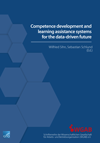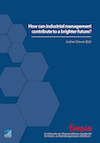Search


Bibtex
Cite as text
@Book{Sihn+Schlund,
Cite-key = "wgab2021",
Year= "2021",
Volume= "Schriftenreihe der Wissenschaftlichen Gesellschaft für Arbeits- und Betriebsorganisation (WGAB) e.V.",
Journal = "WGAB",
Title= "Competence development and learning assistance systems for the data-driven future ",
Author= "Wilfried Sihn, Sebastian Schlund (Ed.) ",
Doi= "https://doi.org/10.30844/wgab_2021",
Abstract= "The continuous acquisition of new digital competences and the development of situational learning assistance systems will become more important than ever in the coming years, because the world of work is becoming more complex, more informative and all above more data-driven. Jobs are changing due to increasing digitalisation, whereby the use of modern technologies must be designed in a way, that employees can continue to work productively in the company despite these changes and benefit purposefully from digital solutions. The research results presented under the main topic „Competence development and learning assistance systems for the data-driven future“ address this problem of state of the art technologies in the workplace and their effects on workers. The members of the Scientific Society for Work and Business Organisation (WGAB) present innovative concepts and research results for practitioners and scientists and thus provide valuable input for current challenges. ",
}
Wilfried Sihn, Sebastian Schlund (Ed.)(2021): Competence development and learning assistance systems for the data-driven future . Schriftenreihe der Wissenschaftlichen Gesellschaft für Arbeits- und Betriebsorganisation (WGAB) e.V.(2021)Online: https://doi.org/10.30844/wgab_2021 (Abgerufen 19.04.24)
Open Access
Abstract
Abstract
The continuous acquisition of new digital competences and the development of situational learning assistance systems will become more important than ever in the coming years, because the world of work is becoming more complex, more informative and all above more data-driven. Jobs are changing due to increasing digitalisation, whereby the use of modern technologies must be designed in a way, that employees can continue to work productively in the company despite these changes and benefit purposefully from digital solutions. The research results presented under the main topic „Competence development and learning assistance systems for the data-driven future“ address this problem of state of the art technologies in the workplace and their effects on workers. The members of the Scientific Society for Work and Business Organisation (WGAB) present innovative concepts and research results for practitioners and scientists and thus provide valuable input for current challenges.
Keywords
Schlüsselwörter
References
Referenzen
DOI: https://doi.org/10.30844/wgab_2021_1
Successfully developing workplace-related skills using digital assistance systems
Prof. Dr.-Ing. Prof. e. h. Wilhelm Bauer, Fraunhofer Institute for Industrial Engineering IAO Stuttgart
M.A. Maike Link, Fraunhofer Institute for Industrial Engineering IAO Stuttgart
M.A. Walter Ganz, Fraunhofer Institute for Industrial Engineering IAO Stuttgart
DOI: https://doi.org/10.30844/wgab_2021_2
This is how we learn – A Best Practice Case of Qualification in SMEs for Work 4.0
M.Sc. Marc Schwarzkopf, Professorship of Ergonomics and Innovation Management Chemnitz University of Technology
Dipl.-Hdl. Dipl.-Kffr. Susann Zeiner-Fink, Professorship of Ergonomics and Innovation Management Chemnitz University of Technology
Prof. Dr. Angelika C. Bullinger-Hoffmann, Professorship of Ergonomics and Innovation Management Chemnitz University of Technology
DOI: https://doi.org/10.30844/wgab_2021_3
Transdisciplinary competence development for role models in data-driven value creation – The Citizen Data Scientist in the Centre of Industrial Data Science Teams
Univ.-Prof. Dr.-Ing. Jochen Deuse, Centre for Advanced Manufacturing, Faculty of Engineering and Information Technology University of Technology Sydney, Institute of Production Systems TU Dortmund University
René Wöstmann M.Sc., Institute of Production Systems TU Dortmund University, RIF Institute for Research and Transfer e.V. Department Production Systems
Dortmund
Lukas Schulte M.Sc., Institute of Production Systems TU Dortmund University, RIF Institute for Research and Transfer e.V. Department Production Systems
Dortmund
Thorben Panusch M.Sc., Institute of Production Systems TU Dortmund University, RIF Institute for Research and Transfer e.V. Department Production Systems
Dortmund
Josef Kimberger, Bitburger Brewery Group Bitburg
DOI: https://doi.org/10.30844/wgab_2021_4
Virtual Reality Training Applications in Industry – Towards a User-friendly Application Design
Benjamin Knoke M.Sc., BIBA – Bremen Institute for Production and Logistics At the University of Bremen
Moritz Quandt, BIBA – Bremen Institute for Production and Logistics At the University of Bremen
Prof. Dr.-Ing. Michael Freitag, BIBA – Bremen Institute for Production and Logistics At the University of Bremen
Department of Production Engineering University of Bremen
Prof. Dr.-Ing. Klaus-Dieter Thoben, BIBA – Bremen Institute for Production and Logistics At the University of Bremen, Department of Production Engineering University of Bremen
DOI: https://doi.org/10.30844/wgab_2021_5
AI-supported assistance systems in enterprise learning processes – prospects and limitations
Univ.-Prof. Dr.-Ing. habil. Norbert Gronau, Chair of Business Informatics, Processes and Systems University of Potsdam
Dr. rer. pol. Gergana Vladova, Chair of Business Informatics Processes and Systems University of Potsdam, Research Group Education and Continuing Education in the Digital Society Weizenbaum Institute for the Networked Society
DOI: https://doi.org/10.30844/wgab_2021_6
A Learning Assistance System for the Ergonomic Behavioural Prevention in Production
Justus Brosche M.Sc., Production Management and Technology, Hamburg University of Technology
Hannes Wackerle M.Sc. M.Sc., Institute for Biomechanics, BG Clinical Center Murnau gGmbH, Institute for Biomechanics Paracelsus Medical Private University Salzburg
Prof. Dr. hum. Boil. Peter Augat, Institute for Biomechanics, BG Clinical Center Murnau GmbH, Institute for Biomechanics Paracelsus Medical Private University Salzburg
Prof. Dr.-Ing. habil. Hermann Lödding, Production Management and Technology Hamburg University of Technology
DOI: https://doi.org/10.30844/wgab_2021_7
Change in competence requirements due to the pandemic-related change in work organisation – A learning factory approach on machine learning in production companies
Prof. Dr.-Ing. Martin Schmauder, Chair of Labour Engineering TU Dresden
Dipl.-Ing. Gritt Ott, Center for Production Engineering and Organization TU Dresden
Elena Montenegro Hörder M.Sc., Center for Production Engineering and Organization TU Dresden
DOI: https://doi.org/10.30844/wgab_2021_8
How a learning factory approach can help to increase the un- derstanding of the application of machine learning on produc- tion planning and control tasks.
Alexander Rokoss M.Sc., Institute of Product and Process Innovation Leuphana University Lüneburg
Kathrin Kramer M.Sc., Institute of Product and Process Innovation Leuphana University Lüneburg
Prof. Dr.-Ing. habil. Matthias Schmidt, Institute of Product and Process Innovation Leuphana University Lüneburg
DOI: https://doi.org/10.30844/wgab_2021_9
Competence Development within Hybrid Value Creation – Need-based Competence Development for the Successful Implementation of Hybrid, Data-Driven Business Models
Prof. Dr.-Ing. habil. Sascha Stowasser, Institute of Applied Industrial Engineering and Ergonomics Düsseldorf, Institute of Human and Industrial Engineering Karlsruhe Institute of Technology (KIT)
Nicole Ottersböck, Institute of Applied Industrial Engineering and Ergonomics Düsseldorf
DOI: https://doi.org/10.30844/wgab_2021_10
Collaborative Approaches for Self-Organized Competence Development
Dr.-Ing. Heiko Matheis, Center for Management Research, German Institutes of Textile and Fiber Research Denkendorf
Jennifer Lucke M.Sc., Institute for Diversity Studies in Engineering (IDS), University of Stuttgart
Prof. Dr. rer. pol. Dipl.-Ing. Meike Tilebein, Institute for Diversity Studies in Engineering (IDS) University of Stuttgart, Center for Management Research, German Institutes of Textile and Fiber Research Denkendorf
DOI: https://doi.org/10.30844/wgab_2021_11
Towards a maturity model of human-centered AI – A reference for AI implementation at the workplace
Prof. Dr. Uta Wilkens, Institute of Labor Science, Chair for Work, Human Resources and Leadership Ruhr-Universität Bochum
Valentin Langholf (M.Sc.), Institute of Labor Science, Chair for Work, Human Resources and Leadership Ruhr-Universität Bochum
Greta Ontrup (M.Sc.), Department of Work and Organizational Psychology Faculty of Psychology, Ruhr-Universität Bochum
Prof. Dr. Annette Kluge, Department of Work and Organizational Psychology Faculty of Psychology, Ruhr-Universität Bochum
DOI: https://doi.org/10.30844/wgab_2021_12
Developing competencies for collaborative work settings in a virtual simulation laboratory – Training approach and performance measurement
Annabelle Beyer M.Sc. Management, Institute of Work Science Ruhr-University Bochum
Murat Keskin, Institute of Work Science Ruhr-University Bochum, Workplace-integrated assistance systems conducive to learning designed for production
Dr.-Ing. Dirk Berndt, Fraunhofer Institute for Factory Operation and Automation IFF Magdeburg
DOI: https://doi.org/10.30844/wgab_2021_13
Workplace-integrated assistance systems conducive to learning designed for production
Dr.-Ing. Tina Haase, Fraunhofer Institute for Factory Operation and Automation IFF Magdeburg
Wilhelm Termath, Department of Vocational Education and Human Resources Development Otto von Guericke University Magdeburg
Prof. Dr. habil. Michael Dick, Department of Vocational Education and Human Resources Development Otto von Guericke University Magdeburg
Univ.-Prof. Dr.-Ing. habil. Michael Schenk, Fraunhofer Institute for Factory Operation and Automation IFF Magdeburg
DOI: https://doi.org/10.30844/wgab_2021_14
A Modular Federated Learning Architecture for Integration of AI-enhanced Assistance in Industrial Maintenance – A novel architecture for enhancing industrial maintenance management systems in the automotive and semiconductor industry.
Univ.-Ass. Dipl.-Ing. Linus Kohl, Research Group Smart and Knowledge Based Maintenance Institute of Management Science, TU Wien
Fraunhofer Austria Research GmbH Vienna
Priv.-Doz. Dr.-Ing. Fazel Ansari, Research Group Smart and Knowledge Based Maintenance Institute of Management Science, TU Wien, Fraunhofer Austria Research GmbH Vienna
Univ.-Prof. Dr.-Ing. Dipl. Wirtsch.-Ing. Prof. eh. Dr. h.c. Wilfried Sihn, Institute of Management Science TU Wien, Fraunhofer Austria Research GmbH Vienna
DOI: https://doi.org/10.30844/wgab_2021_15
Neuro-adaptive tutoring systems – Neurophysiological-based recognition of affective-emotional and cognitive states of learners for intelligent neuro-adaptive tutoring systems
Katharina Lingelbach M.Sc., Applied Neurocognitive Systems, Fraunhofer Institute for Industrial Engineering IAO, Department of Psychology, Applied Neurocognitive Psychology Lab University of Oldenburg
Sabrina Gado M.Sc. Psychologie, Fraunhofer Institute for Industrial Engineering IAO Stuttgart
Prof. Dr.-Ing. Prof. e. h. Wilhelm Bauer, Fraunhofer Institute for Industrial Engineering IAO Stuttgart
DOI: https://doi.org/10.30844/wgab_2021_16
Analysis of supply-chains in the circular economy by means of VSM
Jeff Mangers, Manufacturing Engineering University of Luxembourg
Prof. Dr.-Ing. Peter Plapper, Manufacturing Engineering University of Luxembourg
DOI: https://doi.org/10.30844/wgab_2021_17
Human-Centered Development and Evaluation of an AR-Assistance System to Support Maintenance and Service Operations at LNG Ship Valves
Dr.-Ing. Hendrik Stern, BIBA – Bremen Institute for Production and Logistics At the University of Bremen
Rieke Leder, BIBA – Bremen Institute for Production and Logistics At the University of Bremen
Dr.-Ing. Michael Lütjen, BIBA – Bremen Institute for Production and Logistics At the University of Bremen
DOI: https://doi.org/10.30844/wgab_2021_18
Assistance systems in learning factories – A systematizing overview and case studies
Dr. rer. pol. Christof Thim, Chair of Business Informatics Processes and Systems University of Potsdam
Dr. rer. pol. Gergana Vladova, Chair of Business Informatics Processes and Systems University of Potsdam, Research Group Education and Continuing Education in the Digital Society Weizenbaum Institute for the Networked Society
Dr.-Ing. Sander Lass, Chair of Business Informatics Processes and Systems University of Potsdam

 English
English
